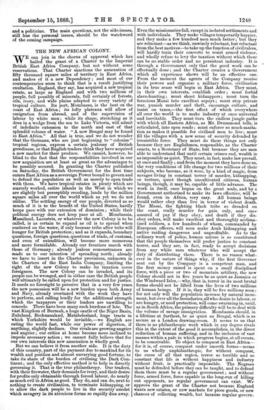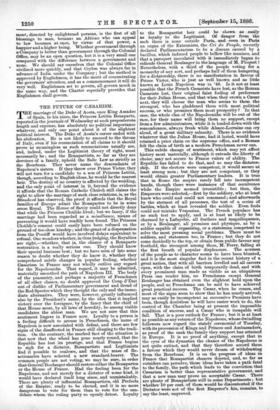1 R P. NEW AFRICAN COLONY.
W11 can join in the chorus of approval which has hailed the grant of a Charter to the Imperial British East Africa Company, but not without some reservations. That Charter sanctions the annexation of fifty thousand square miles of territory in East Africa, and makes of it a new Dependency ; and most of our contemporaries seem to think that is a result justifying exultation. England, they say, has acquired a new tropical estate, as large as England and with two millions of people, full possibly of minerals, full certainly of forests, oils, ivory, and wide plains adapted to every variety of tropical culture. Its port, Mombassa, is the best on the coast of East Africa; its lofty plateaux will allow of emigration from abroad, and of the supervision of labour by white men ; while its shape, stretching as it does in a wedge from the sea to Lake Victoria, will admit of indefinite extension to the north and east of that splendid volume of water. "A new Bengal may be found in East Africa." All that is true, and we do not wonder that the Germans, who are just beginning to " colonise" tropical regions, express a certain jealousy of British greediness, or that English traders think they have acquired a new market for their produce. We cannot, however, be blind to the fact that the responsibilities involved in our new acquisition are at least as great as the advantages to be possibly secured. In granting the Charter published on Saturday, the British Government for the first time enters East Africa as a sovereign Power bound to govern and to defend the population as well as merely to open trade with them. We have tropical estates in plenty which are scarcely worked, entire islands in the West in which we are slightly but perceptibly receding, lands by the million square miles all over the world which as yet we do not utilise. The settling energy of our people, diverted as so much of it is to the benefit of the United States, hardly keeps pace with our extension of dominion ; while their political energy does not keep pace at all. Mombassia, Masailand, Lacustris, or whatever the new Colony is to be called, is as certain to expand as oil is to spread when scattered on the water, if only because tribe after tribe will hunger for British protection ; and as it expands, boundary questions, foreign questions, questions of trade, of customs, and even of extradition, will become more numerous and more formidable. Already our frontiers march with those of Germany ; already jealous remonstrances are made as to our intention of spreading north ; already we have to insert in the Charter provisions, unknown in the Charters of the East India Company, limiting the right of the new Colony to make its taxation cover foreigners. The new Colony can be invaded, and its people can be wronged, and in either case the British people will ultimately be called upon for protection and for justice. It needs no foresight to perceive that in a very few years the new possession will be a new burden upon both Army and Navy, already overtaxed with the work they have to perform, and calling loudly for the additional strength which the taxpayers or their leaders are unwilling to concede. There have been many such burdens of late. The vast Kingdom of Burmah, a huge cantle of the Niger Basin, Zululand, Bechuanaland, Matabelesland, huge tracts in which Yorkshire would be invisible,—we English are eating the world fast, while our power of digestion, if anything, slightly declines. Our rivals are growing angrier and angrier; our critics at home become more inclined to impede necessary action ; we cannot fully believe that for our own interests this new annexation is wholly good.
But we can believe it from another side. It is the duty of this country, part of the payment due to mankind for its wealth and position and almost unvarying good fortune, to take its share of the burden of civilising the Dark Con- tinent; and the only effective method is to help in directly governing it. That is the true philanthropy. Our traders, with their firewater, their demands for ivory, and their desire for profits only obtainable through forced labour, do nearly as much evil in Africa as good. They do, and can do, next to nothing to create civilisation, to terminate kidnapping, or to allow the dark people to live in the security amidst which savagery in its atrocious forms so rapidly dies away. Even the missionaries fail, except in isolated settlements and with individuals. They make villages temporarily happier, and they make a few hundred men much better; but they are reluctant—as we think, unwisely reluctant, but reluctant from the best motives—to take up the function of civil rulers, will hardly train their converts to resist armed violence, and wholly refuse to levy the taxation without which there can be no stable order and no persistent industry. It is through a Government only that the good work can be effectually done ; and the Charter creates a Government which all experience shows will be an effective one. From the moment the agents of the Company receive their powers and organise a military force, civilisation in its true sense will begin in East Africa. They must, in their own interests, establish order ; must forbid slave-hunting ; must shoot kidnappers ; must turn the ferocious Masai into excellent sepoys ; must stop private war, punish murder and theft, encourage culture, and insist on taxes,—the first effect of which everywhere all over the world is to make industry at once universal and inevitable. They must turn the endless jungle paths with which all Eastern Africa, as Mr. Drummond tells. is reticulated, into open roads ; must enforce so much sanita- tion as makes it possible for civilised men to live ; must fill the villages with a new sense of security defended by irresistible force. They must do these things not only because they are Englishmen, responsible, as the Charter enacts, to a Secretary of State, but because they are men able to understand that until certain crimes end, wealth is as impossible as quiet. They must, in fact, make law prevail, at once and finally ; and from the moment they have done so, the very conditions of life change for two millions of their subjects, who become, as it were, by a kind of magic, from savages living in constant terror of murder, kidnapping, or torture, quiet though uncultivated citizens, human beings, thoUgh, it may be, capable of little advance. The work in itself, once begun on the great scale, and by a Government authorised to make its laws effective, will be found, even in Africa, very easy. All human beings would rather obey than live in terror of violent death. The Masai, the fighting black tribe so dreaded on the coast, really murder for gain only, and once assured of pay if they obey, and death if they dis- obey orders, will make excellent and thoroughly acclima- tised soldiers, a few hundreds of whom, commanded by European officers, will soon make Arab kidnapping and native raiding dangerous and unprofitable. As to the ordinary work of police, human nature is so constituted that the people themselves will prefer justice to constant terror, and they are, in fact, ready to accept decisions from any white men whatever who will accept the duty of distributing them. There is no reason what- ever in the nature of things why, if the first Governor sent out by the Company is a competent man, and the first money raised is spent on a small disciplined force, with a piece or two of mountain artillery, the new Colony should not in five years be as quiet as Jamaica or the Windward Isles,—why, that is, terror in its most brutal forms should not be lifted from the lives of two millions of human beings. If it is, they will be five millions soon ; for not only will the population increase by natural incre- ment, but over all the boundaries, all who desire to labour, or are hungry, or need protection, will come swarming in, until, as in South Africa, the primary difficulty will be to deal with i the volume of savage immigration. Mombassia should, in a lifetime at furthest, be as quiet as Bengal, which is as secure as a London drawing-room. It seems to us that there is no philanthropic work which in any degree rivals this in the extent of the good it accomplishes, in the direct reduction of human suffering, and in the inclusion of vast masses within a pale in which progress begins, at all events, to be conceivable. To object to conquest in East Africa— for it is, of course, conquest under smooth forms—seems to us wholly unphilanthropic, for without conquest, the curse of all that region, terror so terrible and so constant that life is without happiness and industry without fruit, is practically impossible. The Negroes must be defended before regular be taught, and to defend be them there must a r government ; and without force, armed force, force capable in the long-run of killing out opponents, no regular government can exist. We approve the grant of the Charter not because England wants new estates, or new markets for piece goods, or new chances of collecting wealth, but because regular govern- went, directed by enlightened persons, is the first of all blessings to man, because an African who can appeal to law becomes at once, by virtue of that power, a happier and a higher being. Whether government through a Company is better than government through the Colonial Office, may be an open question, but it is a very small one compared with the difference between a government and none. We should say ourselves that the Colonial Office civilised more quickly, and that Ceylon was always fax in advance of India under the Company ; but the method is approved by Englishmen, it has the merit of concentrating the governors' attention, and as a commencement it will do very well. Englishmen set to govern, all govern much in the same way, and the Charter especially provides that Englishmen shall govern.



































 Previous page
Previous page